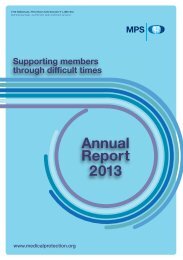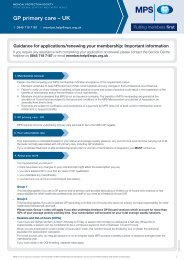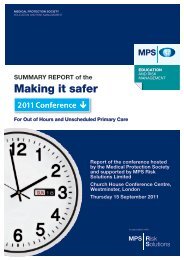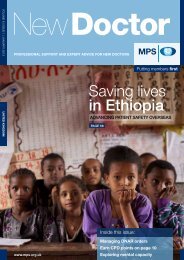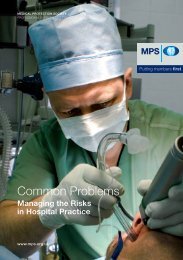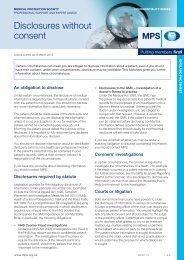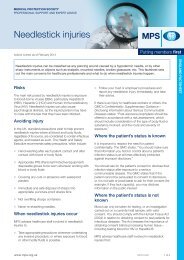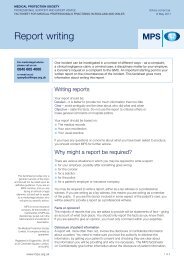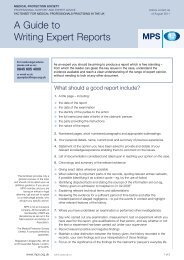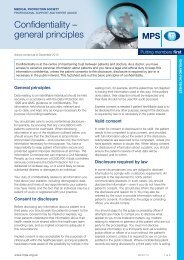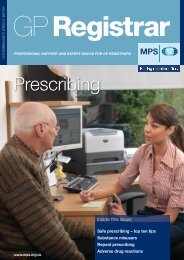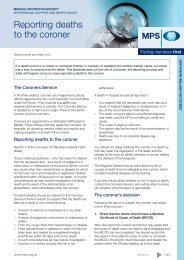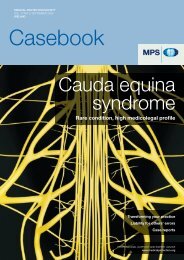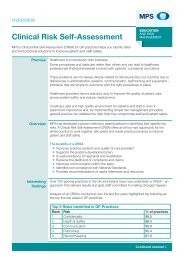Dr Rob Hendry - Medical Protection Society
Dr Rob Hendry - Medical Protection Society
Dr Rob Hendry - Medical Protection Society
You also want an ePaper? Increase the reach of your titles
YUMPU automatically turns print PDFs into web optimized ePapers that Google loves.
12<br />
ARTICLE<br />
UNITED KINGDOM CASEBOOK | VOLUME 19 | ISSUE 1 | JANUARY 2011 www.mps.org.uk<br />
Sympathy in the surgery<br />
Doctors are encouraged to be open with patients when things go<br />
wrong, to show compassion when dealing with sensitive issues<br />
and to communicate effectively. Sarah Whitehouse asks whether<br />
there is room for empathy, or even emotion, in the clinical setting<br />
“ I<br />
remember telling a family that<br />
their father, who had been<br />
admitted only hours earlier, had<br />
died in theatre,” recounts Mr Tom<br />
Berry, a trainee general surgeon.<br />
“I prepared as I have been taught. I<br />
took a nurse with me. I left my pager<br />
with someone else. I ensured that we<br />
had somewhere private. I prepared to<br />
answer any expected questions and<br />
what I would say the next steps were.<br />
Despite all this, as I broke the news<br />
to his wife, I realised I had tears in my<br />
eyes. His wife asked if I was okay. I<br />
felt guilty, as if I was intruding on their<br />
grief or trying to elicit sympathy.”<br />
WHAT IS EMPATHY?<br />
Coined from the Greek roots em and<br />
pathos (feeling into), empathy is the<br />
ability to put yourself in another person’s –<br />
the patient’s – shoes. 1 It is understanding<br />
a person’s subjective experience by<br />
sharing it vicariously, but maintaining<br />
an observant stance. 2 The observant<br />
stance is perhaps the key to empathising<br />
effectively in medicine – as a doctor, you<br />
cannot afford to become so consumed<br />
by a situation that you do not have the<br />
capacity to treat. Emotion, though, is<br />
what makes us human – should it be<br />
seen as something to shy away from?<br />
EMOTIONAL INTELLIGENCE<br />
“I don’t think I would be able<br />
to do my job properly without<br />
being able to empathise with my<br />
patients,” says <strong>Dr</strong> Ayesha Rahim,<br />
former Deputy Chair of the UK’s<br />
BMA Junior Doctor Committee.<br />
As a junior doctor in psychiatry, she<br />
explains: “It’s a huge thing for patients<br />
to tell you something extremely<br />
personal about themselves. It’s<br />
important to be attuned to what they<br />
are saying, and how they are saying it,<br />
by looking out for non-verbal clues.”<br />
Traditionally, empathy in clinical<br />
practice was bound up with the vague<br />
term “bedside manner” – you either<br />
had it, or you didn’t. It couldn’t be<br />
taught or improved. Now, however,<br />
empathic communication can be<br />
seen more as a taught skill, and<br />
one that is essential in order to fully<br />
understand a patient’s condition.<br />
Clinical empathy is about<br />
understanding a patient’s symptoms<br />
and feelings, and communicating that<br />
fact to the patient. It is important to<br />
check back with the patient when<br />
taking a history to show you fully<br />
understand, for example, “Let me<br />
see if I have this right.” Verbalising<br />
their emotion, eg, “You seem<br />
anxious about your chest pains,”<br />
demonstrates active listening.<br />
Being blind to emotional cues can<br />
lead to longer consultations and<br />
increased frustration from patients. It<br />
might even make a patient more likely<br />
to pursue a clinical negligence claim or<br />
complaint, should something go wrong.<br />
<strong>Dr</strong> Ann McPherson is <strong>Medical</strong><br />
Director of the DIPEx Health<br />
Experiences Research Group, which<br />
established www.healthtalkonline.org,<br />
documenting patients’ experiences<br />
of their treatment. She says: “It’s not<br />
easy to be empathic to vulnerable,<br />
needy people 100% of the time. Being<br />
able to do it is something healthcare<br />
practitioners have to learn – in the<br />
same way that they learn clinical skills.<br />
“Over ten years, researchers<br />
employed by Oxford University have<br />
carried out detailed interviews with<br />
more than 2,000 patients. Many of<br />
them express gratitude and respect<br />
for the practitioners who have cared<br />
for them, but you only have to click on<br />
the ‘communication with healthcare<br />
practitioners’ link to find examples<br />
of people who have been upset,<br />
embarrassed, or even damaged by<br />
a lack of empathy and compassion<br />
on the part of doctors and nurses.”



